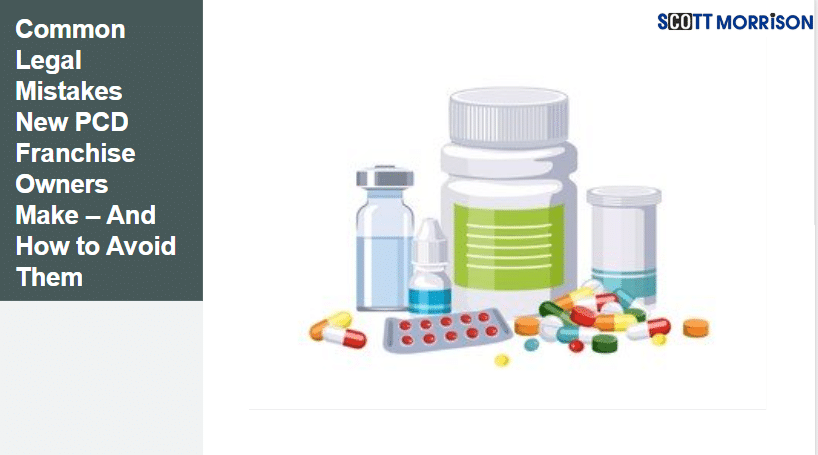Common Legal Mistakes New PCD Franchise Owners Make—And How to Avoid Them
Starting a PCD pharma franchise is a lucrative and rewarding business opportunity. With pharmaceutical demand in India scaling new heights, bolstered by the government’s support for entrepreneurship, one can see many individuals and small investors stepping into this field to find their place. However, a PCD franchise can be made or broken not merely by product quality or marketing but also heavily by legal compliance and due diligence. Lets discuss common legal mistakes new PCD franchise owner make and how to avoid them.
Unfortunately, many new PCD franchise owners unwittingly make legal mistakes at the very start of their business endeavors. These pitfalls could set them back in terms of authority, fines, business disruption, and, in some cases, cancellation of license. At Scott Morrison, we have worked with countless franchise partners and know well the various legal pitfalls that could mar your journey ahead.
In this blog, we are going to look at the most common legal mistakes that new PCD franchise owners unwittingly fall prey to and how to avoid them hereafter.
Table of Contents
ToggleWhat a PCD Pharma Franchise?
PCD is an acronym for Propaganda cum Distribution. A PCD pharma franchise grants individuals or small distributors the right to use a pharmaceutical company’s brand name and products for marketing and distribution within a specified territory.
The business model operates at a low risk, requires little capital investment, and grants sole distribution rights; hence, it has gained popularity with new pharma entrepreneurs.
On the other hand, legal clarity is of utmost importance to avoid disputes and possible regulatory hitches later down the line.
List of Mistakes New PCD Franchise Owner Make
1. Not Having a Legally Sound Franchise Contract
Most first-time franchise owners tend not to read or pay any regard to a direct franchise contract and are guided either by verbal promises or simple agreements, which very much lack any legal value.
Why It’s Dangerous:
Without a binding legal contract, a plethora of problems can arise when you’re dealing with supply chains, territorial rights, pricing, and brand usage.
How to Avoid It:
- Always insist on a formal agreement before starting a business.
- Ensure it has clauses on territorial exclusivity, payment options, termination conditions, and a guarantee of product supply.
- Have a legal advisor or a pharma law expert scrutinize the agreement.
2. Overlooking Drug License and GST registration
Some entrepreneurs think that avoiding drug license requirements and GST registration for PCD models is fine with their respective Operations. That would be wrong.
Why It’s Dangerous:
The operation without a drug license is highly illegal and could lead to hefty penalties or a complete shutdown. A GST registration process is essential to comply with taxes and for seamless operations.
How to Avoid It:
- For your business model, apply for a wholesale or retail drug license.
- Before raising invoices to clients, ensure demand registration with GST beforehand.
- Keep your license renewed and updated with changes in address and changes in ownership.
3. Not Clearly Defining Territory
Some new franchise owners begin running their operations without defining territory accurately, mainly in the absence of a mention of this in the agreement.
Why Is This so Dangerous?
The worst is that, in case there are no exclusive territory rights, another distributor can be named in that very same territory, resulting in internal competition and a loss of faith.
How to Avoid This:
- Make sure your franchise agreement specifies your territorial rights (city, district, or state).
- Do not sign an agreement with companies that might have overlapping franchises.
4. Ignoring Product Trademark and Brand Rights
Many new PCD owners start selling products without checking the brand’s trademark registration status.
Why It Is Dangerous:
If you use unregistered or disputed trademarks, it can lead to legal actions, market confusion, and rebranding costs.
How to Avoid It:
- Always ask the parent company for proof of trademark registration.
- Avoid promoting or printing the materials for unregistered product names.
5. Common Documentation Error
Certain distributors have been known to overlook details such as keeping proper records of invoices or agreements, tax returns, and product batch details.
How It Poses a Risk:
Auditors may face difficulties when tracing the products back to certain batches during renewal of licenses or upon some complaint regarding a product.
How to Avoid:
- Retain both physical and digital copies of all important business documents.
- Maintain batch-wise records of inventory and billing.
- Ensure adherence to all GST and pharma compliance on billing.
6. Working Without an NOC from the Previous Franchisee (In the Same Area)
A few new franchisees start business in territories assigned to another distributor without obtaining a No Objection Certificate (NOC).
How This is Risky:
It makes for territorial disputes and court cases with the company or other franchise holders.
How to Avoid It:
- Verify with the company that it is not assigned to anyone else.
- If reassigned, a written NOC from the previous distributor must be obtained.
7. Vague Credit and Payment Terms
Most new franchise owners have trouble clarifying terms of payment, especially with respect to the duration of credit or if payments should be delayed.
Why It’s Risky:
Disagreements with respect to payment timelines may cause a rift between a franchisee and franchise or bring unscheduled interruptions in the supply of goods and services.
How to Avoid It:
- In addition to advance payment or credit, penalties for delayed payments should also be mentioned in the agreement.
- The company is to send written communication regarding payment timelines.
8. Failure to Confirm Product Certifications and Compliance.
Several franchisees resort to selling products without verifying whether the products have duly been certified by DCGI, FSSAI, or even whether they comply with either ISO or GMP specifications.
Risks:
Selling a non-compliant product could expose distributors and their companies to legal repercussions and tarnish their reputation.
Ways to Avoid:
- Always request copies of proper certificates.
- Make sure that the product is based on the approved by regulatory bodies if necessary.
Final Thoughts
A PCD pharma franchise business can be an exciting opportunity, but one that necessitates an appropriate legal framework. The initial mistakes may appear trifling, but can snowball into huge challenges that can hinder your growth and profitability.
By avoiding these common legal errors, the smooth process, the cordial relationship with the parent company, and successful work for years to come are ensured.
At Scott Morrison, we not only provide quality pharmaceutical products but also provide legal guidance, development, and compliance guidance for all our franchise partners. It is our principle that when you grow, we grow, and that begins by helping you not to make mistakes from the very start.
FAQ About Common Legal Mistakes New PCD Franchise Owners Make
Q1. Do I need a drug license to start a PCD franchise business?
Yes, there is a mandatory possession of a valid drug license to purchase and sell pharmaceutical products under any PCD model.
Q2. What role does the franchise agreement play in PCD pharma?
It legally defines your territory and lays out the rights, obligations, and terms of business of both parties. It offers certain protection for the franchisee as well as the franchiser.
Q3. Can I work without being registered under GST?
No. You cannot issue tax invoices, claim input credits, or remain compliant with the legal system without getting registered.
Q4. What support does Scott Morrison give to new franchisees?
Scott Morrison offers franchising agreements, exclusivity in franchise territories, guidance on legal documentation, promotional support, and certification of product lines to enable you to build your success.





